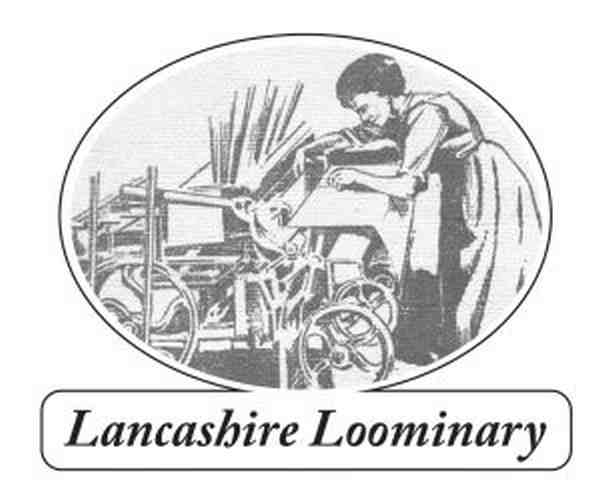The Northern Weekly Salvo
Incorporating Slaithwaite Review of Books, Weekly Notices, Sectional Appendices, Tunnel Gazers’ Gazette etc. Descendant of Teddy Ashton’s Northern Weekly and Th’Bowtun Loominary un Tum Fowt Telegraph.
In association with The Lancashire and North Lonsdale Loominary
Published at Station House, Kents Bank, Lancashire-North-of-the-Sands, LA11 7BB email: paul.salveson@myphone.coop
Publications website: www.lancashireloominary.co.uk
No. 311 June 30th 2023 SUMMER SATURDAY RELIEF
Salveson’s half-nakedly political digest of railways, tripe and secessionist nonsense from Up North. Not really weekly, definitely Northern.
After a long gap….
Here’s your Summer Salvo….after a long gap here’s a bumper ‘Bolton Holidays’ special. The usual varied focus including a look at the current state of things within the railway industry, a fascinating new novel set in Farnworth and Hindley, arguments for ‘The Parish Commune’ and some recent trips to places of interest across the North.
My latest book Lancastrians – mills, mines and minarets is now available. It’s a rather unconventional history of an unconventional place. We can’t even agree where it actually is (I cover ‘real Lancashire from the Mersey to the Lakes). 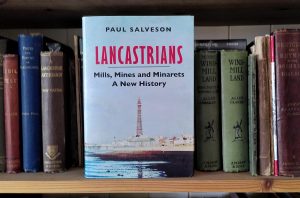 It’s about culture, identity and the rise, fall and maybe the rise again of a great county-region. More details elsewhere in The Salvo – events are being planned in Blackburn, Bolton, Barrow, Blackrod and other places not beginning with ‘B’ including Grange-over-Sands (July 12th). Open to invitations for talks elsewhere.
It’s about culture, identity and the rise, fall and maybe the rise again of a great county-region. More details elsewhere in The Salvo – events are being planned in Blackburn, Bolton, Barrow, Blackrod and other places not beginning with ‘B’ including Grange-over-Sands (July 12th). Open to invitations for talks elsewhere.
It has been a bad time for friends passing on. Keen Salvo reader, ace reciter, model engineer and surgeon John Brandrick died suddenly a few weeks ago. Harold Elletson, former Tory MP, naked gardener and subsequent champion of Northern devolution, died in Berlin a few days ago (see Times and Daily Telegraph obituaries June 29th). David Tomlinson, who did outstanding work around drug rehabilitation, died in London recently. Condolences to their families and friends.
Holiday Time!
Today (Saturday June 30th) would have been the start of Bolton Holidays – always the last Friday of June, for a fortnight. Everywhere shut. Looking back, the two weeks had an almost surreal air, with normal life totally changed. I suppose you could say it was as though a huge pandemic had hit Lancashire and everyone had died. In fact they were enjoying themselves in Blackpool, Rhyl, Newquay or Scarborough. The same process had been repeated in Oldham a week earlier, and the other cotton towns through July.
The tradition of the Lancashire ‘Wakes Weeks’ (we never called it ‘Wakes’ in Bolton) goes back to medieval times and local religious ceremonies. Farnworth still had its own ‘Wakes’ in the early 1900s, which was more of a fair. Bolton holiday week was just called ‘Bolton Holidays’.
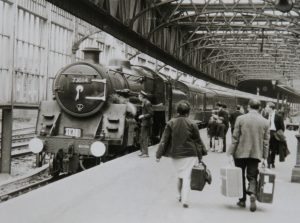
During the 19th century the combination of rapid population growth and the development of the railways allowed the possibility for working class people taking a holiday. Whitsun was the main holiday period, with a mass exodus from Bolton and other ‘cotton towns’ on Whit Friday. However, it was only in the late 19th century that workers were given a full week off, and that was without pay.
By the end of the 19th century the cotton industry was a highly organised industry, with the owners combined in powerful trade associations; their counterparts were the cotton unions, equally well organised and influential. The employers decided between themselves which town would have its’ week holiday. Oldham went first, followed by Bolton the week after at the end of June. Burnley, Bury and Wigan had their holidays in early July followed by Blackburn and the North-East Lancashire towns at the end of the month. The week’s shutdown, only lengthened to a fortnight after the Second World War, enabled the mill engines and machinery such as looms and spinning mules to be overhauled and given a thorough clean. Paid holidays didn’t come until 1941, so it was only after the war that the holiday ‘boom’ really took off. A further week was added in September.
The ‘staggered’ holidays were helpful for the railway companies who would have been overwhelmed if every town had its ‘wakes week’ around the same time. As it was, the railways struggled to cope with the huge demand for ‘specials’ taking families to Blackpool, Southport, Morecambe and further afield including North Wales and the West Country.
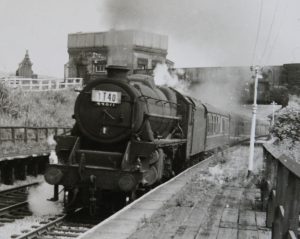
Most trains left from Trinity Street, though some – particularly the North Wales trains – went from Great Moor Street, a tradition which continued for sevral years after the station had officially closed in 1954. I was on one of the last, in 1958.
During the inter-war years families would save up all year for their week’s holiday. Thousands were members of savings clubs, known locally as ‘Diddle ‘em clubs’ because of the frequency of the collectors running off with the takings! The safest option was to save with the Co-op, which also organised holidays, including transport by train or ‘charabanc’. Some companies, such as Walker’s, ran their own ‘holiday fund’ which employees paid into each week.
In those days it was normal for families to take their own food in tin containers – the landlady would cook the food for them, though there was the more expensive option of having meals made for you. In many guest houses families would invite neighbours or other members of the extended family to join them for their tea!
So for one week in every year, popular destinations such as Blackpool and Rhyl became ‘Bolton by the sea’. The Bolton Evening News was on sale along the sea front and the paper sent staff . Probably the high point of Bolton Holidays for the railways was the late 1950s and early 1960s.
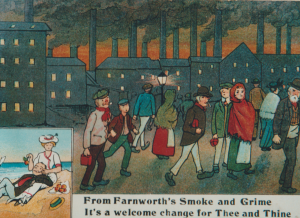
The 1962 holidays saw 31 special trains leaving Trinity Street, 13 on the Friday evening and 18 on the Saturday. Destinations on Friday night included Newquay, Heysham (for the boat to Northern Ireland), Bournemouth, London (St Pancras), Paignton, Plymouth, Yarmouth, Holyhead, Eastbourne and Portsmouth. On the Saturday, the rush started with a train to Penychain, for Butlin’s, via the now closed route from Bangor and Caernarfon. There were further North Wales trains to places including Llandudno, Bangor, Rhyl and Caernarfon. Other destinations included Filey Holiday Camp, Liverpool (for the Isle of Man), Skegness and of course Blackpool.
Additional locos were drafted to Crescent Road sheds and Bolton drivers and firemen had a rare chance to widen their horizons, with some working trains through to North Wales. The coaching stock was assembled at Horwich, Lostock Junction, Moses Gate and other locations. The 7.00 special to Llandudno used ‘borrowed’ Jubilee class express loco ‘Manitoba’ and was worked by Bolton driver Jack Ritson and fireman Tommy Bustard throughout. An Oldham – Blackpool ‘Wakes Week
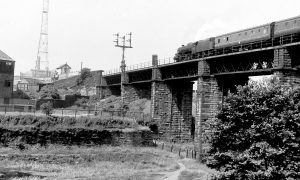
Jack Hartley and fireman Cliff Edge worked a later special all the way to Bangor with another borrowed ‘Jubilee’ from Patricroft depot.
Life in Bolton, especially for the first week, was completely different from usual. It became like a ghost town. The factory chimneys stopped smoking and you could see the Welsh mountains from the top of Smithills Dean Road. Most shops closed, including newsagents. Children set up ‘pop up’ paper shops on the pavements, sometimes earning a bit of extra pocket money but not always.
The decline of ‘Bolton Holidays’ happened almost imperceptibly. As the mills and engineering factories went into decline there wasn’t the same co-ordinated ‘shutdown’ at the end of June; the mills had shut for good. If there can be said to be an ‘end’ it was in 1992, when schools went over to a standardised national pattern of summer holidays. By then, Bolton had changed dramatically and people’s leisure habits had as well. Cheap foreign holidays by air became normal, though some people maintained the old traditions of Blackpool or the North Wales Coast.
(this is based on a longer piece in The Bolton News last year. Many thanks to Steve Leyland for additional notes on loco movements.)
Railpolitics
There’s been a lot happening in the railway world recently. The news that TransPennine Express was to be nationalised (see elsewhere in this Salvo) didn’t come as a big surprise and hopefully will provide an opportunity to re-set relationships with the unions. It was a good move to appoint Northern’s Chris Jackson as interim MD (and, equally, for Craig Harrop to step into his shoes as Regional Director at Northern, also ‘interim.’) My very best wishes to both, but also to the TPE team who have copped for a lot of blame, unfairly.
ASLEF has ended its ban on overtime and rest day working at TPE so hopefully things will start to change quite quickly. However, the wider dispute over pay and conditions shows little sign of being resolved any time soon. The continuing dispute is massively damaging to the railways and to its customers. If, as the unions claim, progress is being held back by UK Government interference, Sunak needs to let the unions and management get on with negotiating a settlement that’s in everyone’s interest. It has already happened in Scotland and Wales. Now, there’s a coincidence – no UK Government sticking its oar in.
Meanwhile lots of friends enjoyed watching Ben Elton’s Channel 4 piece on ‘The Great British Railway Disaster’ recently. It was entertaining stuff but other than telling us what we already knew, it was short on analysis.

Why has TransPennine Express been so awful? Maybe a chat with the unions might have helped. No single reason explains it all, but the ban on overtime (now relaxed) was probably the biggest cause of the misery at TPE. As I’ve argued repeatedly, ownership on its own is not a panacea. You can have an absolutely awful operation run by the state and some good private train companies (Chiltern, Merseyrail to name but two). Many on The Left have this touching faith in the power of the (capitalist) state whilst The Right thinks private ownership will as if by magic run a better rail service. The reality is we now have a railway that is mainly state-controlled, with ownership of infrastructure in the hands of the state (Network Rail) and about a quarter of train services run by (UK) state-owned companies. The rest are, to a large extent, told what to do by the Government. Are there alternatives? Yes, most definitely…read on!
TransPennine Express – a suitably socialised case for devolution?
The news that TransPennine Express (TPE) was to be transferred into the public sector, stripping First Group of its contract, came as little surprise. Despite new trains and a major recruitment programme, the company struggled to run a reliable service leaving thousands of passengers angry and frustrated. TPE is a major player in the UK transport scene, providing services across the North of England and into Scotland, under contract to the Department for Transport.
So what happens now? The Government has stressed that TPE’s transfer to the public sector, under the wing of the ‘Operator of Last Resort’ (OLR) was a temporary measure before the company was returned to the private sector. It joins South-Eastern, LNER and Northern as part of OLR’s expanding portfolio. There remain difficult issues around industrial relations, as well as major infrastructure works forming part of the TransPennine route upgrade between Manchester and Leeds, which includes long-awaited electrification. However, the news that Aslef is ending its ban on overtime is very welcome. It lays the basis for recovery, with scope to make TPE a showpiece for what a good quality railway company should look like, both as a service to passengers and as an employer. That needs TPE’s new management team being given the sort of freedom that their LNER colleagues enjoy.
There a need for some longer-term thinking about how TPE should fit into the bigger picture. Currently, railways in the UK are rudderless, lacking any sort of ‘guiding mind’ to bring coherence and direction to the industry. Rumours are rife that the proposed ‘Great British Railways’ has been sidelined though the recent announcement that Sir Peter Hendy has been re-appointed as chair of Network Rail (effectively ‘GBR in waiting’) is very welcome and suggests there gossip could be misplaced. Had Hendy not been reappointed that would have sent a very clear message that GBR was dead. So let’s see. But whether GBR happens or not, there’s plenty that can be done, sooner rather than later.
The current situation in the North of England, with both TPE and Northern being in the state sector, offers opportunities for fresh thinking which Labour should seize on, instead of repeating glib mantras about nationalisation (25% of all train operators are now in the state sector and infrastructure is controlled by state-run Network Rail).
The last thing either TPE or Northern need is a return to the private sector, though a long period of uncertainty and ‘interim’ management won’t be helpful either. The most straightforward approach would be to keep the two operators under state ownership. However, there is a growing appetite amongst Northern politicians to get control of their rail network; taking on responsibilities for the two Northern operators would be quite an attractive proposition.
The most obvious vehicle would be Transport for the North (TfN), a sub-national transport body run by a consortium of local authorities but without the powers enjoyed by Transport for London. That should change, with more resources and expertise given to TfN. The Department for Transport has the power to transfer responsibility for both contracts to a body such as TfN if it chose to do so.
If that happened, Transport for the North could, if it wanted to be more radical, set up the two operations as social enterprises. There are business models out there to guide them, including the experience of Welsh Water and other larger businesses. An arms-length mutual approach, in which any surplus is ploughed back into the business, is the sort of innovative approach which Labour should be looking it. A significant amount of worker and passenger involvement could form part of the structure.
A new, socially-owned TransPennine Express, working closely with Northern, could pick up the threads that have been lost over the last couple of years and contribute towards the creation of a railway of which the North could be truly proud.
That begs a bigger question about the accountability of TfN. In Scotland and Wales the transport bodies (Transport Scotland, Transport for Wales) are overseen by a democratically elected parliaments with ministers holding transport responsibilities. It’s difficult to work out where the accountability of TfN lies. Its chair, Sir Patrick McLoughlin, is well respected and it could be said that his accountability is to the TfN board which comprises politicians from across the North. That’s OK as far as it goes but the North needs its own directly-elected parliament – just like Wales and Scotland –which could drive TfN forward and ensure it has the resources and expertise that bodies like Transport for London enjoy. Maybe regional parliaments for Yorkshire, the North-West and North-east collaborating in pan-Northern bodies like TfN would work, but the present arrangements ensure not only a lack of democratic legitimacy but a body which lacks real clout and is constantly at risk of cuts or even abolition by central Government.
(This is based on a longer article article which appears in the current issue of RAIL).
Moving – and remaining
The best laid plans, as they say…after announcing my complete move to Station House at Kents Bank in the last Salvo (seems a long time ago), things have changed a bit. After trying to sell my house in Bolton and not doing very well with it, I’ve decided to be a true Lancashire cosmopolite and hop between Kents Bank and Bolton. We’re now comfortably ensconced in our former Furness Railway residence and getting to know the local community; Station House will be much

more than a ‘holiday home’. How much I’ll divide my time between Bolton and Kents Bank remains to be seen; it will vary. I’ll have the best of both Bolton and magnificent Morecambe Bay. It means that difficult decisions about what to do with the garden railway and my book collection can be avoided. However, a branch of the Halliwell Light Railway has appeared in the yard of Station House and will be home to visiting engines from the parent depot. Real-life human visitors to Station House are very welcome – say hello if there’s any sign of life (give a ‘one’ on the signalbox bell by the front door, to call attention.)
Blue Labour and radical local democracy
I’ve always liked Maurice Glasman’s political writings and his willingness to speak the sometimes unspeakable. At a time when the Left in England is pretty much devoid of fresh ideas (Compass is a welcome exception to the rule – see below) Glasman keeps pushing radical ideas which ought to command a wider audience than they do. Part of the problem is the ‘Blue Labour’ name: it puts off a lot of people are Labour because they think it’s a Tory incursion, and may alienate others who just see it as relevant to the Labour Party. Actually, the ideas in his latest book – Blue Labour: the Politics of the Common Good – are relevant to a broad audience who find the simplicities of Left as well as Right. Much of his think reflects the influence of Catholic Social Teaching, which has quite a lot to offer, whatever your religious views. What I found particularly interesting in the book was Glasman’s ideas for very local democracy and the potential for the much-derided ‘parish council. He also stands up for the return of ‘the ceremonial county’ as a unit of self-government, reflecting people’s continuing strong sense of identity with ‘their’ county. He says:
“There should be a redistribution of power to the smallest unit of self-government. The parish is an elemental aspect of our polity, ecclesiastical and temporal. The parish, the country, the town and the city remain the fundamental units of affection, attachment and affiliation.” (p. 116)
Glasman argues for a strengthening of local democracy and the need to learn from the brave experiments in popular participation by the Kurdish People’s Defence Units (YPG) in the Rojava area which did so much to defeat ISIS, suggesting the revitalizing of local democracy through ‘parish communes’ inspired by their politics of the common good.
He counterposes ‘the ideology of globalization’ based on ‘the centrality of the internet, of online shopping and Netflix’ with active citizenship and says: ‘Unlike the parish council, which has very limited powers, the parish commune would be a direct democracy in which issues of immediate concern to residents could be addressed and voted upon….’
I’d say that there is scope to build on the work of some existing parish and town councils to develop his ideas for ‘parish communes (I keep putting in ‘Paris Commune’ which was quite a different and much bloodier thing). The ‘Flatpack Democracy’ ideas developed by the ‘Independents for Frome’ have shown that what was a dreary and inactive parish council can be transformed. If Maurice hasn’t visited Frome, I’d suggest he hops on a GWR train and meets up with some of the Flatpack democrats: it would be a very productive conversation.
Finding my political Compass
After a slight reluctance (too many meetings in one day) I was persuaded by our CRP treasurer to attend the Compass open meeting in Manchester a few weeks’ ago to launch its ‘Winning as One’ campaign. Compass is a great organization, lobbying hard for greater democracy and a ‘politics of the common good’. A central focus is the need for voting reform, and getting proportional representation. Compass is ‘of the Left’ but provides welcome space for Greens, Lib  Dems and nonaligned radicals (self included) as well as Labour types. Neal Lawson, founder of Compass and a great ‘bringer together’ of people, is currently under threat of expulsion from the Labour Party for advocating cross-party working , which is further reason why I’m less and less likely to vote Labour at a General Election.
Dems and nonaligned radicals (self included) as well as Labour types. Neal Lawson, founder of Compass and a great ‘bringer together’ of people, is currently under threat of expulsion from the Labour Party for advocating cross-party working , which is further reason why I’m less and less likely to vote Labour at a General Election.
The Manchester event included Andy Burnham, who spoke well, and passionately, on the need for PR and a more inclusive form of politics. It was held at the Night and Day Café in central Manchester and included some amazing street music from ‘Mr Wilson’s Second Levelers’. Compass described the evening:
The Greater Manchester Mayor joined Compass Deputy Director Frances Foley in conversation to discuss how progressives can build their collective power across the North ahead of the next general election. He called on the Labour Party to ‘lose its ambivalence to devolution’ and reflected on the mistakes New Labour made in leaving this programme of democratic renewal unfinished, warning that without electoral reform and a rewiring of our political system, we could be looking at ‘another Tory-dominated century.’ He said proportional representation could bring about a ‘massive switch of power to the people over the vested interests’, adding: “We have a parliament that doesn’t represent all people and all places equally. How can that possibly be acceptable to anybody in 2023?”
They added that “Winning As One means that instead of working against each other, progressives will campaign and fight together – not just against the Conservatives, but for a different, more collaborative kind of politics….at the last election, there was a higher concentration of ‘progressive tragedy’ seats in Greater Manchester than anywhere else in the country. These are seats where support for progressive parties outnumbered support for the Conservatives at the last general election, but the Tories still won because the progressive vote was split. Over half a million voters in Greater Manchester are represented by a Conservative who benefitted from this progressive division. We can’t let this happen again.”
A Lancashire Story
I’m enjoying Ged Melia’s latest novel – A Lancashire Story. It is initially set in a working class (Irish Catholic) family from Farnworth though we follow the fortunes of the family from as Austin progresses his career is an engineer – initially in a local colliery, then in the cotton industry. The novel features Allen Clarke’s ‘Teddy Ashton’ stories and also the Winter Hill Trespass of 1896. Ged has done his homework and it represents a realistic picture of working class life in south Lancashire at the end of the 19th century. I’m half way through so looking forward to reading how the family fortunes end. A Lancashire Story is available on Amazon.
The Parbold Bottle
It was very nice to get an email from retired medic Ken Hampden, about a mysterious monument about our political history – The Parbold Bottle (thanks to being touch through the People’s History Museum). The ‘Parbold Bottle’ (see pic on the left with Ken) was erected in the 1830s following the passing of the 1832 Reform Act and is sited on the top of Parbold Hill, close to the Beacon. It looks across the Lancashire Plan and out to the Irish Sea. The monument was originally sited a bit higher up but was relocated on a nearby spot in the 1950s. 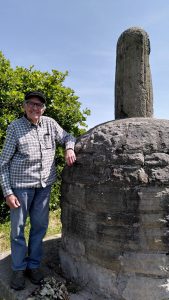 The monument poses many questions: who erected it and why there? The local landowner doesn’t appear to have been even moderately radical and Parbold wasn’t notable for its revolutionary zeal, though there were several local pits in the area. Why would the landowner have permitted the monument on his land? The 1832 was of course something of a damp squib, and disappointed working class hopes for at least make suffrage. The Chartist Movement emerged in the late 1830s to demand a much wider suffrage but the process took decades, with full adult suffrage taking nearly a century to achieve. It was interesting talking to Ken about the need for a modern day ‘Reform Act’ that would include proportional representation and regional devolution. For now, the Parbold Bottle remains an enigma. It’s easy to locate: either walk up from the village or park at the top of Parbold Hill (ice cream van on hand) and walk down a short distance and a path goes off to the left. The monument is well looked after by the local and has some information about its history, as much as we know,
The monument poses many questions: who erected it and why there? The local landowner doesn’t appear to have been even moderately radical and Parbold wasn’t notable for its revolutionary zeal, though there were several local pits in the area. Why would the landowner have permitted the monument on his land? The 1832 was of course something of a damp squib, and disappointed working class hopes for at least make suffrage. The Chartist Movement emerged in the late 1830s to demand a much wider suffrage but the process took decades, with full adult suffrage taking nearly a century to achieve. It was interesting talking to Ken about the need for a modern day ‘Reform Act’ that would include proportional representation and regional devolution. For now, the Parbold Bottle remains an enigma. It’s easy to locate: either walk up from the village or park at the top of Parbold Hill (ice cream van on hand) and walk down a short distance and a path goes off to the left. The monument is well looked after by the local and has some information about its history, as much as we know,
Salvo Shorts
Pear Mill
I’m a great fan of old mill buildings, particularly where they are being put to good modern-day uses. Yorkshire has probably more than we have over here, not least Salt’s Mill at Saltaire and the amazing mill complex in Halifax. However, there are some good examples around, particularly (as you’d expect) Manchester but also in East Lancs, Preston and Rochdale. Bolton continues to allow its mill heritage to be torn down. It was really interesting to visit Stockport recently and have a look round Pear Mill.
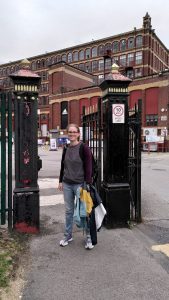
It is amazingly well-preserved and was one of the later examples of spinning mill, completed in 1912. There s a very good ‘antiques market’ with a café, and also a shop selling oatcakes (the Derbyshire version but very nice). Nearby Vernon Mill has some galleries but we didn’t get chance to look: a good reason for a return visit. Very much welcome for other good examples of mill conversions/exciting uses for former mills or other industrial buildings.
Bradford-by-the-Sea: days out in Morecambe
Is Morecambe finally on the up? It looks so, following the granting of the half the cost of the new Eden Project, which will be located very close to what remains of Morecambe station. I’ve been a couple of times recently and liked the feel of the town. It isn’t as lively as when I lived there in 1971 when I was in my first year at Lancaster, but has gone through difficult times since. The Midland Hotel has made a huge difference to the town and I like the public art, mostly featuring birds and poetry, on view around the place. Heysham (by the way, pronounced ‘Hee-shum’) is a delightful spot and I found a place that still settles Nettle Beer (though not produced in the village any more). St Patrick’s church is one of the most lovely places anywhere, with fabulous views out to Morecambe Bay and (if you’ve good eyesight) 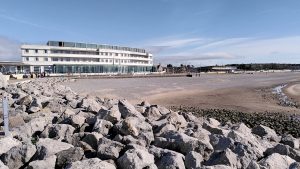 Station House at Kents Bank. It’s a very pleasant walk from Heysham village back into Morecambe past ’The Battery’. Highly recommended is Atkinson’s fish restaurant on Albert Road.
Station House at Kents Bank. It’s a very pleasant walk from Heysham village back into Morecambe past ’The Battery’. Highly recommended is Atkinson’s fish restaurant on Albert Road.
I hope the train service improves. The community rail partnership for the Bentham Line (Leeds- Lancaster-Morecambe’) has been doing a grand job and has promoted the route as Britain’s first ‘dementia friendly line’. Bare Lane, next station up the line, is a great example of station adoption. But Morecambe needs a better rail service including electrification (only a couple of miles required) and direct trains to Manchester and Liverpool.
Bradford itsel: JB Priestley celebrated in his home city
I was very impressed by Bradford’s Literature Festival which took place last week. I only managed to get to one event, but it was well worth the trip over from Accrington. The event was ‘Inspired by JB Priestley’s English Journey’ and was hosted by my pal Lindsay Sutton, who is also chair of the JB Priestley Society. Lindsay was born and bred in Bradford and had the good sense to move to Lancashire in his later years, probably trying to instill a bit of sense in us Lancs. (sorry Lindsay, couldn’t resist that). The panel discussion was introduced by Lindsay who had the pleasure of meeting Priestley in his later years and challenged him about why he travelled around the country for English Journey in a chauffeur-driven car! The panelists were John Higgs and Kathryn Walchester who both contributed fascinating aspects of Priestley’s work. After that we adjourned to the Midland Hotel, which is always a delight. Maybe Priestley’s ghost was lurking in the bar enjoying a glass of Taylor’s bitter.
Kents Bank in Party Mode
Friends of Kents Bak Station and Foreshore held a very jolly Station Garden Party in May. There were plenty of stalls (the Plant Stall proved particularly popular) as well as an excellent local band (The Sands Band, see pic). There was a visiting mini traction engine and (thanks to 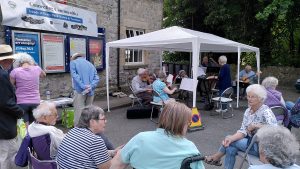 Community rail Network) a special bus operating between the station, Allithwaite and Cartmel. The weather was lovely and it was great to see visiting station friends from as far afield as Mytholmroyd, Reddish South, Marple, Settle, Bolton and Littleboorugh. Thanks to Northern for their support.
Community rail Network) a special bus operating between the station, Allithwaite and Cartmel. The weather was lovely and it was great to see visiting station friends from as far afield as Mytholmroyd, Reddish South, Marple, Settle, Bolton and Littleboorugh. Thanks to Northern for their support.
Local MP Tim Farron visited the station recently and was impressed with the great work being done by the station volunteers.  Meanwhile, the Beach Hut Gallery at the station has a new exhibition for the summer period. Well worth popping in, there’s some great stuff (open Thursday to Sunday 11.00 to 16.00)
Meanwhile, the Beach Hut Gallery at the station has a new exhibition for the summer period. Well worth popping in, there’s some great stuff (open Thursday to Sunday 11.00 to 16.00)
Platform 5 Gallery
The P5 Gallery at Bolton Station has been hosting a great exhibition by students at Woodbridge College, following on from the success of their show last year. ‘True Colours’ is running for a few more weeks.
Explore Rivington by Bus – for Nowt!
The popular country park at Rivington is usually only accessible by car (or bike). However, for the third time running, South East Lancashire CRP has organised a Sundays/Bank Holidays bus service to serve the area. It’s the 125R and this year is operated by Stagecoach. It runs every hour from 10.40 to 16.40, from Horwich Parkway station via

Middlebrook and Horwich. It returns from Rivington Village Hall every hour from 11.00 17.00 and operates on a ‘hail and ride’ basis. It does a loop from Horwich via Rivington Lane, Horrobin Lane and back along New Road and Bolton Road to Horwich. IT’s FREE! Many thanks to Horwich Town Council and TfGM for their support.
Celebrating the life and achievements of the late Margaret Jackson through an exhibition of her artwork assembled by her family. These stunning works have been donated by them in the hope they will raise funds for the Bolton Hospice and Bury Hospital Cancer Ward, both of which looked after Margaret towards the end of her life. Margaret’s work explored many subjects and issues from trees and landscapes to mystical places, protest groups, allotments and architecture and the diversity and variety within the exhibition makes it quite unique.
Lancastrians: at a gradely book shop near you
Lancastrians: Mills, Mines and Minarets – a new history is now available, published by the highly-respected publishers Hurst whose catalogue is well worth a look at it. See https://www.hurstpublishers.com/catalogues/spring-summer-2023/.
The publisher’s blurb says says: “This long-overdue popular history explores the cultural heritage and identity of Lancashire. Paul Salveson traces to the thirteenth century the origins of a distinct county stretching from the Mersey to the Lake District—‘Lancashire North of the Sands’. From a relatively backward place in terms of industry and learning, Lancashire would become the powerhouse of the Industrial Revolution: the creation of a self-confident bourgeoisie drove economic growth, and industrialists had a strong commitment to the arts, endowing galleries and museums and producing a diverse culture encompassing science, technology, music and literature. Lancashire developed a distinct business culture, its shrine being the Manchester Cotton Exchange, but this was also the birthplace of the world co-operative movement, and the heart of campaigns for democracy including Chartism and women’s suffrage.
Lancashire has generally welcomed incomers, who have long helped to inform its distinctive identity: fourteenth-century Flemish weavers; nineteenth-century Irish immigrants and Jewish refugees; and, more recently, New Lancastrians from Asia, Africa and Eastern Europe. The book explores what has become of Lancastrian culture, following modern upheavals and Lancashire’s fragmentation compared with its old rival Yorkshire. What is the future for the 6 million people of this rich historic region?”
The book has chapters covering culture, politics, sport, leisure, industry, religion as well as a ‘Cook’s Tour’ of the county (mostly by train). It explores the Lancastrians who left for new lives in America, Canada, Russia and South Africa, as well as the ‘New Lancastrians’ who have settled in the county since the 14th century. There are about forty ‘potted biographies’ of men and women who have made important (but often neglected) contributions to Lancashire.
The book is published on June 29th 2023 in hardback, price £25. Salvo readers can get a 25% discount by going to the publisher’s website (www.hurstpublishers.com) and enter the code LANCASTRIANS25 at checkout.
Lancastrians Launched around Lancashire
There are quite a few ‘launch’ events planned for the book. This is the current list up to mid-August:
- Grange Library: Wednesday July 12th at 15.00
- Bolton Library (Lecture Theatre) July 13th at 13.00
- Barrow Library: August 17th at 14.00
I’m open to offers from community groups, societies, libraries and other organizations to talk about the book.
Last Train from Blackstock Junction
My new(isgh) book comprising 12 short stories about railway life in the North is now available. Last Train from Blackstock Junction includes a very appropriate tale about the last train from somewhere called ‘Blackstock Junction’ on November 5th 1966, when a group of kids succeeded in stopping the Glasgow – Manchester express which they mistakenly thought was the last stopping train from their local station. Oops.What very naughty boys. Don’t try this on your local railway.
The book has a very kind foreword by Sir Peter Hendy, chairman of
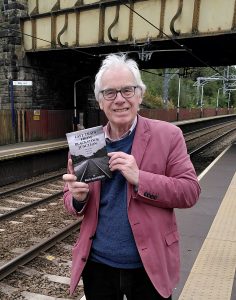
Network Rail, who said “As you read these stories, you’ll find some history, some romance, some politics, a little prejudice – sadly – and some humour; you will in fact be in the world of railway men and women. I hope you find them as absorbing as I did when I read Paul’s manuscript. Please enjoy his work!”
Writer and environmentalist Colin Speakman said “it is an amazing collection – powerful, moving, and what I would call ‘faction’ which tells truths even though the details may be fantasy, ‘Hillary Mantel school of history’ perhaps. Director of Platform 5 Publishing, Andrew Dyson, said “Paul’s stories provide a fascinating insight into what life was really like for thousands of railway workers.”
The tales include a ghost story set in a lonely signalbox in Bolton, in 1900, while other stories are about life on today’s railway, including ‘From Marxist to Managing Director’ – the story of a young female political activist who ends up running a train company. Some are set in the ‘age of steam’ and life on the footplate as well as the rise of the trades unions on the railways and the rise of the Labour movement.
Salvo readers will get the book at a specially discounted price, courtesy of Platform 5 Publishing. Go to https://www.platform5.com/Catalogue/New-Titles. Enter LAST22 in the promotional code box at the basket and this will reduce the unit price from £12.95 to £10.95.
The three launches (Elsecar, Bolton and Carnforth) all went well and I’m giving talks to a number of other groups over the next few weeks.
Talks, walks and wanderings
Recent talks have included ‘The Social History of Lancashire’s Railways’ for Preston Historical Society, ‘Allen Clarke’s Bolton’ for Friends of Smithills Hall and Bolton U3A, ‘Railways and Railwaymen of Turton’ for Turton LHS, ‘Moorlands, Memories and Reflections’ for What’s Your Story, Chorley? and ‘Railways and Communities: Blackrod and Horwich’, for Blackrod LHS. I’ve had already done several talks on my new book ‘Lancastrians’ book including Chorley Historical Society, Blackrod Local History Group, Preston Retired Railwaymen and Stretford Probus Club.
Other topics I speak on are:
- The Lancashire Dialect Writing tradition
- The Railways of the North: yesterday, today and tomorrow
- Allen Clarke (1863-1935) Lancashire’s Romantic Radical
- The Winter Hill Mass Trespass of 1896
- The Rise of Socialism and Co-operation in the North
- The Clarion Cycling Clubs and their Club Houses
- Walt Whitman and his Lancashire Friends
- Forgotten Railways of Lancashire
- Banishing Beeching: The Community Rail Movement
- Railways, Railwaymen and Literature
I charge fees that are affordable to the organisation concerned, to fit their budget – so by negotiation. My preferred geographical location is within 25 miles of Bolton, ideally by train/bus or bike. With sufficient notice I can go further afield.
READERS’ LETTERS
Since it has been a long gap since the last Salvo I’m leaving ‘readers’ Letters’ until Issue 312 – please send ‘em in.
Still in Print (at special prices!)
ALLEN CLARKE: Lancashire’s Romantic Radical £6.99 (normally £18.99)
Moorlands, Memories and Reflections £15.00 (£21.00)
The Works (novel set in Horwich Loco Works) £6 (£12.99)
With Walt Whitman in Bolton £6 (9.99)
The Settle-Carlisle Railway (published by Crowood £24) – can do it for Salvo readers at £16
See www.lancashireloominary.co.uk for full details of the books (ignore the prices shown and use the above – add total of £3 per order for post and packing in UK)
